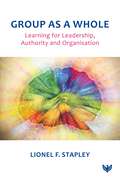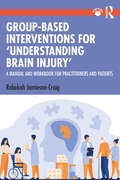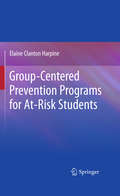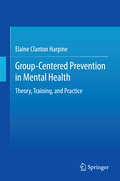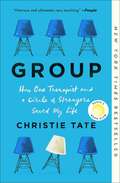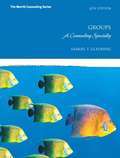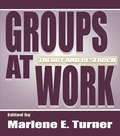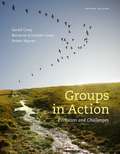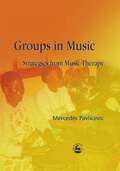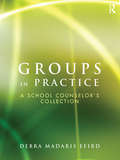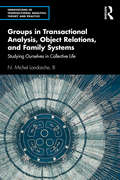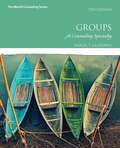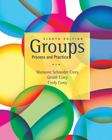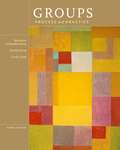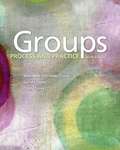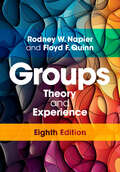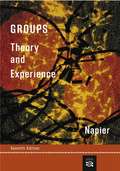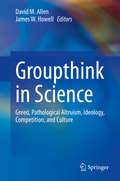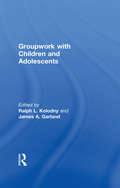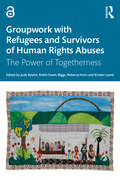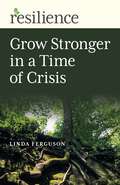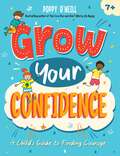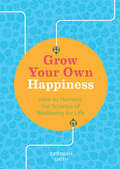- Table View
- List View
Group as a Whole: Learning for Leadership, Authority and Organisation
by Lionel F StapleyThe focus of this volume is on groups. The intention is to go beyond taking things at face value by going deeper and exploring the underlying, less evident phenomena concerning groups which occur beneath the surface. The more frequently used approach is to study the behaviour of individuals in a group to create an understanding of group behaviour. The approach taken here is to study groups from the perspective of the group as a whole, which provides a totally different perspective. Thus, while individual actions and relationships in groups is a valid field of study, the group as a whole is another level and unit of study. The book begins with pre-conference activity, particularly the need for 'authority', and a discussion on the importance and understanding of the group as a whole. The subsequent chapters follow the usual structure of IGO group relations conferences (GRCs). The aim is to develop a deeper understanding of group relations learning. This is in no way a substitute for the vital learning from experiential opportunities provided by actual GRCs. By attending, we are able to learn from the way(s) we take up our roles or are mobilised by the group to take up roles, and to understand that our valency can result in us being used repeatedly in the same way. The learning is rich and valuable because it happens in the here and now in direct experience. The book is the perfect guide to group relations conferences for experienced and novice participants alike to enhance their group relations learning experiences. It serves as an excellent introduction to GRCs for the novice and is ideal for those who have attended GRCs to explore their own experiences and emotions. The learning opportunities provide powerful insights to individuals and other group members. Everything that happens at a GRC is done for the learning of the members.
Group-Based Interventions for 'Understanding Brain Injury': A Manual and Workbook for Practitioners and Patients
by Rebekah Jamieson-CraigThis hands-on volume is both manual and workbook, designed to be used alongside the Understanding Brain Injury Group. This group aims to increase the understanding and acknowledgement of acquired brain injury and find ways of coping with the consequences. The manual section outlines the steps needed for practitioners to run the Understanding Brain Injury Group successfully, and the workbook section – also available as a downloadable resource – is intended to be used by patients. The chapters in the manual mirror the structure of the eight sessions of the group, highlighting differing aspects of having a brain injury. Initially, the sessions cover psychoeducation regarding brain injury and what neurorehabilitation entails. Following this, the group then focuses on living with the consequences of brain injury, whether that represents physical, cognitive, emotional or lifestyle changes. Participants are invited to share their experiences and discuss coping strategies to help with both the new limitations as well as the unwanted emotions that frequently exist after brain injury. Goals are set at the beginning of the group and are revisited at the end to decide on whether they were being realistic, overachieving or pessimistic in their outlook at the start of the group. Throughout, the members of the group can record their session activity in the accompanying workbook. Created to be used by clinicians, therapists or any individual, this resource can be used in a post-acute setting such as a neurorehabilitation unit, a slow-stream rehab setting such as community neurorehabilitation or homes specifically aimed at catering for the needs of those with neurological impairments.
Group-Centered Prevention Programs for At-Risk Students
by Elaine Clanton HarpineMeeting the complex needs of at-risk students is a daunting challenge. One solution is to implement a school-based mental health approach that combines learning and counseling. This book focuses on how to implement a week-long integrated program of this kind.
Group-Centered Prevention in Mental Health
by Elaine Clanton HarpineThis book presents the concept of group-centered prevention and provides explanations and exercises for learning the method and teaching it to others. Detailed studies offer evidence for the continuing importance of prevention in mental well-being and distinguishes group-centered prevention from other group interventions by its ability to resolve incipient mental health issues and emotional problems. Case examples with adults, children, couples, and others demonstrate successful uses of group-centered techniques as well as illustrate the problems that arise in group settings. The book's ready-to-apply training exercises give prospective group leaders practice in starting new groups, fostering cohesion, integrating therapeutic factors into sessions, and other core skills. Featured topics include: Group-centered prevention in contrast with other group interventions. Characteristics of effective leaders in group-centered prevention. Benefits of prevention groups as opposed to those gained in counseling and therapy. Key constructs of self-efficacy and intrinsic motivation in group-centered prevention. Stages of development in new groups. Formats for developing training exercises. Group-Centered Prevention in Mental Health is an essential resource for scientist-practitioners, clinicians, and researchers as well as graduate students in such disciplines as school psychology, social work, and public health. Its educational uses span classroom, workshop, and training settings across the health and healing disciplines.
Group: How One Therapist and a Circle of Strangers Saved My Life
by Christie TateA REESE&’S BOOK CLUB PICK * NEW YORK TIMES BESTSELLER The refreshingly original and &“startlingly hopeful&” (Lisa Taddeo) debut memoir of an over-achieving young lawyer who reluctantly agrees to group therapy and gets psychologically and emotionally naked in a room of six complete strangers—and finds human connection, and herself.Christie Tate had just been named the top student in her law school class and finally had her eating disorder under control. Why then was she driving through Chicago fantasizing about her own death? Why was she envisioning putting an end to the isolation and sadness that still plagued her despite her achievements? Enter Dr. Rosen, a therapist who calmly assures her that if she joins one of his psychotherapy groups, he can transform her life. All she has to do is show up and be honest. About everything—her eating habits, childhood, sexual history, etc. Christie is skeptical, insisting that that she is defective, beyond cure. But Dr. Rosen issues a nine-word prescription that will change everything: &“You don&’t need a cure. You need a witness.&” So begins her entry into the strange, terrifying, and ultimately life-changing world of group therapy. Christie is initially put off by Dr. Rosen&’s outlandish directives, but as her defenses break down and she comes to trust Dr. Rosen and to depend on the sessions and the prescribed nightly phone calls with various group members, she begins to understand what it means to connect. &“Often hilarious, and ultimately very touching&” (People), Group is &“a wild ride&” (The Boston Globe), and with Christie as our guide, we are given a front row seat to the daring, exhilarating, painful, and hilarious journey that is group therapy—an under-explored process that breaks you down, and then reassembles you so that all the pieces finally fit.
Groups A Counseling Specialty 6th edition
by Samuel T. GladdingAn engaging and current look at all aspects of group work filled with illustrations, research, and practical skills. This user-friendly text provides readers with a complete and compelling view of group work, including types of groups, development of groups, dynamics within groups, diversity and multicultural issues in groups, specialty groups, ethical and legal issues in groups, groups across the lifespan, theories of groups, and the history of group work. Well-written and filled with helpful and enjoyable illustrations, this sixth edition textbook helps students to fully understand the four basic types of groups - therapy, counseling, guidance, and work/task - through case histories, examples, and clear language. At the same time, Groups: A Counseling Specialty challenges readers to think through how they would handle various group situations and to reflect and learn from their own experiences in groups.
Groups St Andrews 2013
by C. M. Campbell M. R. Quick E. F. Robertson C. M. Roney-dougalEvery four years, leading researchers gather to survey the latest developments in all aspects of group theory. Since 1981, the proceedings of those meetings have provided a regular snapshot of the state of the art in group theory and helped to shape the direction of research in the field. This volume contains selected papers from the 2013 meeting held in St Andrews. It begins with major articles from each of the four main speakers: Emmanuel Breuillard (Paris-Sud), Martin Liebeck (Imperial College London), Alan Reid (Texas) and Karen Vogtmann (Cornell). These are followed by, in alphabetical order, survey articles contributed by other conference participants, which cover a wide spectrum of modern group theory.
Groups at Work: Theory and Research (Applied Social Research Series)
by Marlene E. TurnerThis book has two purposes. First, it is fundamentally about groups at work, both as they attempt to accomplish their goals and as they operate in organizational settings. Second, it draws together group researchers from social psychological and organizational studies. Each chapter focuses on a central issue regarding groups as they work and examines that issue by drawing from both social psychological and organizational research. Thus, this book centers on the convergence and divergence of these two fields.
Groups in Action: Evolution and Challenges, Student Workbook, 2nd Edition
by Gerald Corey Marianne Schneider Corey Robert HaynesThis student workbook is designed to accompany the video Groups in Action: Evolution and Challenges. The video and the workbook emphasize the application of concepts and techniques appropriate to the various stages of a group's development and provide an interactive program of self-study for use with group counseling textbooks. The workbook requires that you become an active learner in your study of group process in action.
Groups in Music: Strategies from Music Therapy
by Mercedes PavlicevicMusic in Groups happens all the time: in the street, the classroom, in music colleges, community centres, hospitals, prisons, churches and concert halls; at raves, weddings, music festivals, public ceremonies, music therapy sessions, group music lessons, concerts and rehearsals. Some group musicking seems to 'work' (and play) better than others; some sessions feel exhausting even if things are going well; and at other times, we can't begin to explain the complex musical and relational textures of group music work to funders, employers, friends, colleagues, or line managers. In this book, music therapist Mercédès Pavlicevic develops a broad-based discourse to describe, analyse and guide the practice of group musicking, drawing on her own extensive experience. The text is illustrated with vignettes drawn from a range of formal and informal settings that include spontaneous public occasions, collective rituals, special and mainstream education, music therapy, the concert hall, the music appreciation group and community work. This book makes you think about balancing individual and group needs, the development of group time, dealing with over-enthusiastic performers who 'hog' the group sound, undercurrents in music groups, the complications of dealing with institutions, preparing music listening programmes and buying instruments for group work - if you're involved in any kind of group musicking, this book is for you.
Groups in Practice: A School Counselor's Collection
by Debra Madaris EfirdThis practical, user-friendly manual will provide school counselors with the information they need to set up and run twelve different counseling groups. Though the author has test-driven the groups with middle school students, the content is easily adaptable for upper elementary and high school students. Each chapter is devoted to a specific group and includes a rationale for the group step-by-step breakdowns of each session reproducible worksheets and activities group-specific evaluation form. Special sections within each chapter provide tips to make implementation easier and address potential problems. Also included are the American School Counselor Association standards that are addressed during the course of the group. Traditional group topics such as Divorce, Grief, and Study Skills join unique groups tailored for students dealing with Asperger Syndrome, Attention Deficit Disorder, Juvenile Diabetes, and Relational Aggression. The author has used her extensive experience to create this invaluable guide which school counselors at all levels of experience will find an essential tool in their group work.
Groups in Transactional Analysis, Object Relations, and Family Systems: Studying Ourselves in Collective Life (Innovations in Transactional Analysis: Theory and Practice)
by N. Michel Landaiche, IIIGroups are arguably an essential and unavoidable part of our human lives—whether we are part of families, work teams, therapy groups, organizational systems, social clubs, or larger communities. In Groups in Transactional Analysis, Object Relations, and Family Systems: Studying Ourselves in Collective Life, N. Michel Landaiche, III addresses the intense feelings and unexamined beliefs that exist in relation to groups, and explores how to enhance learning, development and growth within them. Landaiche’s multidisciplinary perspective is grounded in the traditions of Eric Berne’s transactional analysis, Wilfred Bion’s group-as-a-whole model, and Murray Bowen’s family systems theory. The book presents a practice of studying ourselves in collective life that utilizes a naturalistic method of observation, analysis of experiential data, and hypothesis formation, all of which are subject to further revision as we gather more data from our lived experiences. Drawing from his extensive professional experience of group work in a range of contexts, Landaiche deftly explores topics including group culture, social pain, learning and language, and presents key principles which enhance and facilitate learning in groups. With a style that is both deeply personal and theoretically grounded in a diverse range of studies, Groups in Transactional Analysis, Object Relations, and Family Systems presents a contemporary assessment of how we operate collectively, and how modern life has changed our outlook. It will be essential reading for transactional analysts in practice and in training, as well as other professionals working with groups. It will also be of value to academics and students of psychology, psychotherapy, and group dynamics, and anyone seeking to understand their role within a group.
Groups: A Counseling Specialty
by Samuel GladdingGroups: A Counseling Specialty is a comprehensive look at groups, covering the history of group work, the dynamics of groups, leadership in groups, ethical issues in groups, multicultural aspects of groups, stages of group development, groups across the life span, and the theoretical basis for working with groups. The coverage is current, the style is clear and interesting, and the book challenges students to reflect on what they have learned, as well as on their own experiences in groups. <p><p> The new edition of Gladding’s Groups includes over 120 new references; chapter overviews; brief introductory stories; a new appendix on self-help group organizations; and new material and updates throughout, including additions that focus on social justice, creativity (particularly the work of Keith Sawyer), different specialty groups throughout the lifespan, technology and group work, brief groups, and groups for older adults.
Groups: A Counseling Specialty (The Merrill Counseling Series)
by Samuel GladdingCurrent, comprehensive, and clearly written, this book gives readers what they need to know about group therapy, group counseling, and work groups. Groups: A Counseling Specialty is a comprehensive look at groups, covering the history of group work, the dynamics of groups, leadership in groups, ethical issues in groups, multicultural aspects of groups, stages of group development, groups across the life span, and the theoretical basis for working with groups. The coverage is current, the style is clear and interesting, and the book challenges students to reflect on what they have learned, as well as on their own experiences in groups.
Groups: Process And Practice
by Gerald Corey Marianne Schneider Corey Cindy CoreyLearn to blend theory with practice in group work with GROUPS: PROCESS AND PRACTICE, the respected book that so many helpers (and helpers in training) rely upon every day. Focusing on the "what is" and "how to" of group counseling, the authors use up-to-date examples, guidelines, insights, and an enhanced diversity perspective to show you how group leaders can apply the key concepts of the group process to a variety of groups, including work with children, older adults, and in school settings.
Groups: Process and Practice
by Gerald Corey Marianne Schneider Corey Cindy CoreyLearn to blend theory with practice in group work with GROUPS: PROCESS AND PRACTICE, the respected book that so many helpers (and helpers in training) rely on every day. Focusing on the "what is" and the "how to" of group counseling, the authors use up-to-date examples, guidelines, insights, and an enhanced diversity perspective to show you how group leaders can apply the key concepts of the group process to a variety of groups, including work with children, older adults, and in school settings. Available with InfoTrac Student Collections http://gocengage. com/infotrac.
Groups: Process and Practice
by Gerald Corey Cindy Corey Marianne CoreyLearn to blend theory with practice in group work with Marianne, Gerald, and Cindy Corey's GROUPS: PROCESS AND PRACTICE. Focusing on the "what is" and the "how to" of group counseling, the authors use up-to-date examples, guidelines, insights, and an enhanced diversity perspective to show you how group leaders can apply the key concepts of the group process to a variety of groups. You'll receive practical guidance on working with groups of children, adolescents, and adults in both school settings and community settings. Many new activities encourage active learning, enabling you to see clinical applications come to life in the content that is covered. Also available: the MindTap online learning experience, which includes videos of group counseling sessions that further help to prepare you for professional practice.
Groups: Theory and Experience
by Rodney W. Napier Floyd F. Quinn Matti GershenfeldRetaining the broad yet practical approach of previous editions, this popular textbook has been fully updated with research and theory from the last two decades to guide students through the concepts and principles of group dynamics. It now includes a brand-new introductory chapter, three new chapters on diversity and inclusion, creativity and design, and virtual groups, and dedicated chapters on communication and perception. Each chapter features in-class 'Try this!' activities that promote understanding of practical applications, new case examples from real-world organizations, and enhanced learning objectives to guide readers' learning experience. Hundreds of new studies have been added throughout, and examples consider the effects of the COVID-19 pandemic, remote working, the MeToo movement, social media, climate change, and political polarization. Suitable for both undergraduates and first-year graduates, this textbook is supported by an online test bank, PowerPoint lecture slides, activity worksheets, and suggested additional resources.
Groups: Theory and Experience
by Rodney W. Napier Matti K. GershenfeldGroups includes research on group dynamics and current views on ways to make working in groups more effective. Napier and Gershenfeld present complex concepts in a way that makes them more understandable, recognizing that students are more familiar with the dynamics of individual behavior and building on that knowledge to teach group theory. Case studies provide real-life context and exercises engage students in the learning process by asking them to apply what they learn to their own lives.
Groupthink in Science: Greed, Pathological Altruism, Ideology, Competition, and Culture
by David M. Allen James W. HowellThis book discusses one of the hottest topics in science today, i.e., the concern over certain problematic practices within the scientific enterprise. It raises questions and, more importantly, begins to supply answers about one particularly widespread phenomenon that sometimes impedes scientific progress: group processes. The book looks at many problematic manifestations of “going along with the crowd” that are adopted at the expense of truth. Closely related is the concept of pathological altruism or altruism bias—the tendency of scientists to bias their research in order to further the ideological or financial interests of an “in-group” at the expense of both the interest of other groups as well as the truth. The book challenges the widespread notion that science is invariably a benevolent, benign process. It defines the scientific enterprise, in practice as opposed to in theory, as a cultural system designed to produce factual knowledge. In effect, the book offers a broad and unique take on an important and incompletely explored subject: research and academic discourse that sacrifices scientific objectivity, and perhaps even the scientist’s own ethical standards, in order to further the goals of a particular group of researchers or reinforce their shared belief system or their own interests, whether economic, ideological, or bureaucratic.
Groupwork With Children and Adolescents
by Ralph L Kolodny James A GarlandThis state-of-the-art information on social groupwork with children and youth provides theoretical guidelines and suggestions for practice. Each authoritative chapter represents a blending of old and new practice models and syntheses of various knowledge perspectives and emphasizes the subtlety and unpredictability of groupwork. Experts addresses the issues of getting groups started, adapting group programs to the needs of younger school-age children, and using group therapy with young abused and neglected girls. They also include specific observations about the psychic and social developmental characteristics of the age groupings as a guiding factor in choosing group models and intervention techniques. Topics discussed include aspects of group dynamics, group techniques, resistance, stages in group development, and developmental issues of group members.
Groupwork with Refugees and Survivors of Human Rights Abuses: The Power of Togetherness
by Jude Boyles Rebecca Horn Robin Ewart-Biggs Kirsten LambGroupwork with Refugees and Survivors of Human Rights Abuses describes, explores and promotes the power of groupwork for refugees and survivors of human rights abuses in a range of contexts. Drawing on multiple theoretical approaches, the book features chapters from practitioners running groups in different settings, such as torture rehabilitation services, refugee camps, and reception centres. The voices of participants demonstrate the variety, creativity, and value of group and community approaches for recovery. The editors have gathered chapters into three sections covering: community-based approaches; groups that work through the medium of "body and soul"; and group approaches that focus on change through the spoken word. The book will be relevant to those working in rehabilitation, community, mental health, and humanitarian fields and are interested in using groupwork as part of their services.
Grow Stronger in a Time of Crisis (Resilience)
by Linda FergusonMany of us have wondered how we would respond in the midst of a crisis. You hope that difficult times could bring out the best in you. Some become stronger, more resilient and more innovative under pressure. You hope that you will too. But you are afraid that crisis may bring out your anxiety, your fears and your weakest communication. No one knows when the crisis will pass and things will get better. That's out of your hands. But you can get better. All it takes is an understanding of how human beings function at their best, the willpower to make small changes in perception and behavior, and a vision of a future that is better than today. In the pages of this book, you will learn to create the conditions that allow your best self to show up and make a difference - for you and for others. The "Resilience Series" is the result of an intensive, collaborative effort of our authors in response to the 2020 coronavirus epidemic. Each volume offers expert advice for developing the practical, emotional and spiritual skills that you can master to become more resilient in a time of crisis.
Grow Your Confidence: A Child's Guide to Finding Courage
by Poppy O'NeillA confidence-building companion to help 7+-year-oldsEncourage your child to explore their emotions, overcome their fears and boost their self-confidence with this positive and playful book. Bursting with activities, handy tips and simple exercises, Grow Your Confidence is the go-to guide for empowering children.
Grow Your Own Happiness: How to Harness the Science of Wellbeing for Life
by Deborah SmithScience tells us that happiness is 50% genetic, 10% circumstantial and 40% how we think and act. Which means that it is possible to increase our happiness by up to 40%.For anyone wanting to increase their wellbeing. Grow Your Own Happiness shows how positive psychology - the science of happiness- can be used every day. With key principles explained to provide the foundation for change, tests for measuring wellbeing and simple techniques that can easily be applied to a busy lifestyle, as well as case studies, anecdotes and tips, this book provides everything you need to shine.
